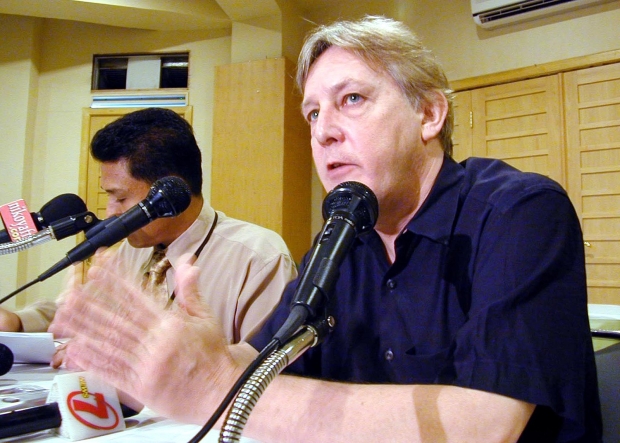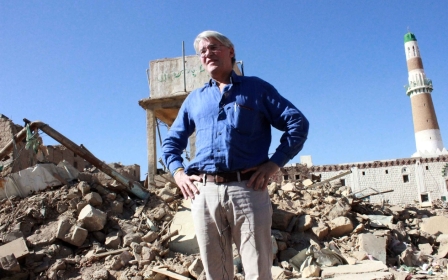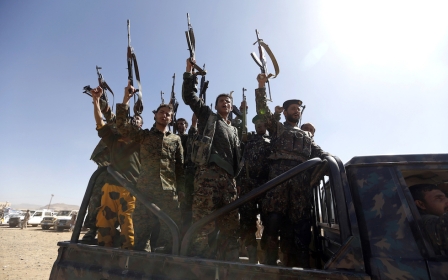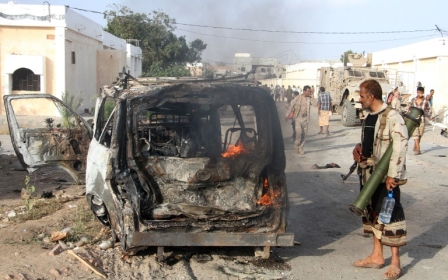Who is Martin Griffiths, UN's new envoy to Yemen?
UNITED NATIONS – Now would be a good time to rethink Yemen's war. The northern Houthi rebels look set to hold out until the Saudi-led coalition's bombs stop falling. Riyadh, likewise, shows no signs of backing off. All the while, fighting, disease and famine grind down the beleaguered population.
Against this disturbing backdrop, British diplomat Martin Griffiths takes over as UN envoy to Yemen at the end of this month. His two predecessors quit in frustration over the gnawing conflict that attracts few headlines and scant attention from the great powers.
By hiring the veteran mediator, the UN is switching tactics. Griffiths asserts that talks between political bigwigs do not get bogged down by rows about aid trucks moving food, fuel and medicine across battlefronts.
He has also carved out a style of bringing women and other civilians to the same negotiating table as generals and warlords to explain exactly what bombs and bullets do to the children they are trying to raise in crater-pocked towns and villages.
It's a neat trick, yet in spite of his diplomatic arsenal, Griffiths has an oversize handicap: links to a British foreign service apparatus that arms Riyadh with weapons and intelligence to use against the Houthis, which diminishes his credibility.
Griffiths, the executive director of the Brussels-based European Institute of Peace (EIP), has dodged journalists since he was appointed earlier this month, but Middle East Eye spotted him at a technical meeting in the basement of the UN headquarters this week.
In a drab conference room, he told diplomats, go-betweens and Red Cross staff about separating talks on access for aid workers from the big political gripes that drive leaders and rebels to take up arms.
"Humanitarian negotiation and political mediation are two different strands," said Griffiths, 67, a married father of two. "They need to be carried out by different people and they should not be integrated and ... will continue to be so, I'm sure, in Yemen."
Griffiths' insistence on this will doubtless see him butt heads with the Saudi-led coalition, which is simultaneously bombing Houthis, blocking sea and air aid routes and running its own large-scale humanitarian operation in Yemen.
Politicisation of aid
For Anna Samulski, a researcher for the Global Centre for the Responsibility to Protect (GCR2P), an advocacy group, the politicisation of aid has made ongoing wars in Syria, Yemen and elsewhere tougher to troubleshoot.
"It's ever-harder to divorce these issues, especially when a party to the conflict advances its own humanitarian plan, as the Saudis are championing in Yemen," Samulski told MEE. "The UN should not publically support this, because a party to the conflict cannot be humanitarian as it cannot be neutral.
"That's what makes this so challenging for Griffiths to navigate."
Griffiths works best behind closed doors, but he occasionally reveals tidbits of his mediation style. In August 2016, while working on Syria, he wrote for Al Jazeera English about al-Nusra Front splitting from al-Qaeda.
"Peace processes are not perfectly designed procedures," he wrote, adding that mediators must seize opportunities when they arise. Another tactic involves giving a voice to suffering civilians while nudging militia chiefs to think twice.
"We then work to connect these groups to the formal process, to broaden the spectrum of actors involved," said Lehmann-Larsen. "I am sure he will develop similarly interesting strategies in his new role, tackling the issues from a variety of angles."
Lehmann-Larsen lauded a boss who "will not be easily replaced". UN spokesman Stephane Dujarric likewise praised his "extensive experience in conflict resolution, negotiation, mediation and humanitarian affairs".
This month, the UN Security Council approved Secretary General Antonio Guterres's appointment of Griffiths as his envoy, making him the third mediator to take on the challenging role in the past seven years.
At the end of February, he is set to replace Ismail Ould Cheikh Ahmed of Mauritania, the UN envoy since early 2015 who last month announced he would not renew his contract after failing to halt the bloodshed. His predecessor, Jamal Benomar, also quit after four years.
'Warring statelets'
Griffiths has an impressive resume, but there is no denying that his stints in Syria, Afghanistan and Libya did not achieve peace or improve life for war-weary civilians. In the 1990s, he held senior UN humanitarian posts in Geneva and New York.
He was the founding director of the Center for Humanitarian Dialogue in Geneva – a position he held from 1999 to 2010 as well as other jobs with UNICEF, the British government and Save the Children, a charity.
Despite stellar credentials, Griffiths' passport and background in Britain's foreign service will leave Houthi leaders wary about a government that sells Riyadh arms and affords it diplomatic cover at the UN. Also, he cannot speak Arabic.
"The optics aren't great, that's for sure," said Samulski of GCR2P. A new UN resolution that was less biased towards the Saudi-led coalition, which intervened in Yemen's civil war in 2015, would give Griffiths a much-needed clean slate, she added.
Carne Ross, a former British envoy and executive director of Independent Diplomat, a consultancy, echoed these concerns, saying the troubleshooter will likely be hampered by a "woeful" lack of resources at the UN.
Also, Griffiths is not helped "by the shameful involvement of permanent members of the UN Security Council in facilitating and perpetuating the conflict, despite their hypocritical words to the contrary," Ross told MEE.
It would be an uphill struggle even without these obstacles. The latest report by UN experts described a state that "has all but ceased to exist" and is collapsing into "warring statelets" that will be hard to stitch back together.
Geopolitical tensions are strong there. Saudi Arabia and the UAE back southern separatists and President Abd Rabbuh Mansour Hadi's government against the Houthis, who are supported by Iran and occasionally lob ballistic missiles in Riyadh's direction.
Meanwhile, militant groups like al-Qaeda in the Arabian Peninsula and the Islamic State (IS) group lurk in inland wadis, willing to take a crack at the Houthis, who adhere to Zaydi-Shia religious principles, or at the Saudi-led coalition.
The death tolls grow daily. The UN says Yemen is the world's worst humanitarian crisis, with about 8 million people on the brink of famine, a cholera epidemic and economic collapse in what was already Arabia’s poorest nation. Griffiths, sadly, has his work cut out for him.
New MEE newsletter: Jerusalem Dispatch
Sign up to get the latest insights and analysis on Israel-Palestine, alongside Turkey Unpacked and other MEE newsletters
Middle East Eye delivers independent and unrivalled coverage and analysis of the Middle East, North Africa and beyond. To learn more about republishing this content and the associated fees, please fill out this form. More about MEE can be found here.





